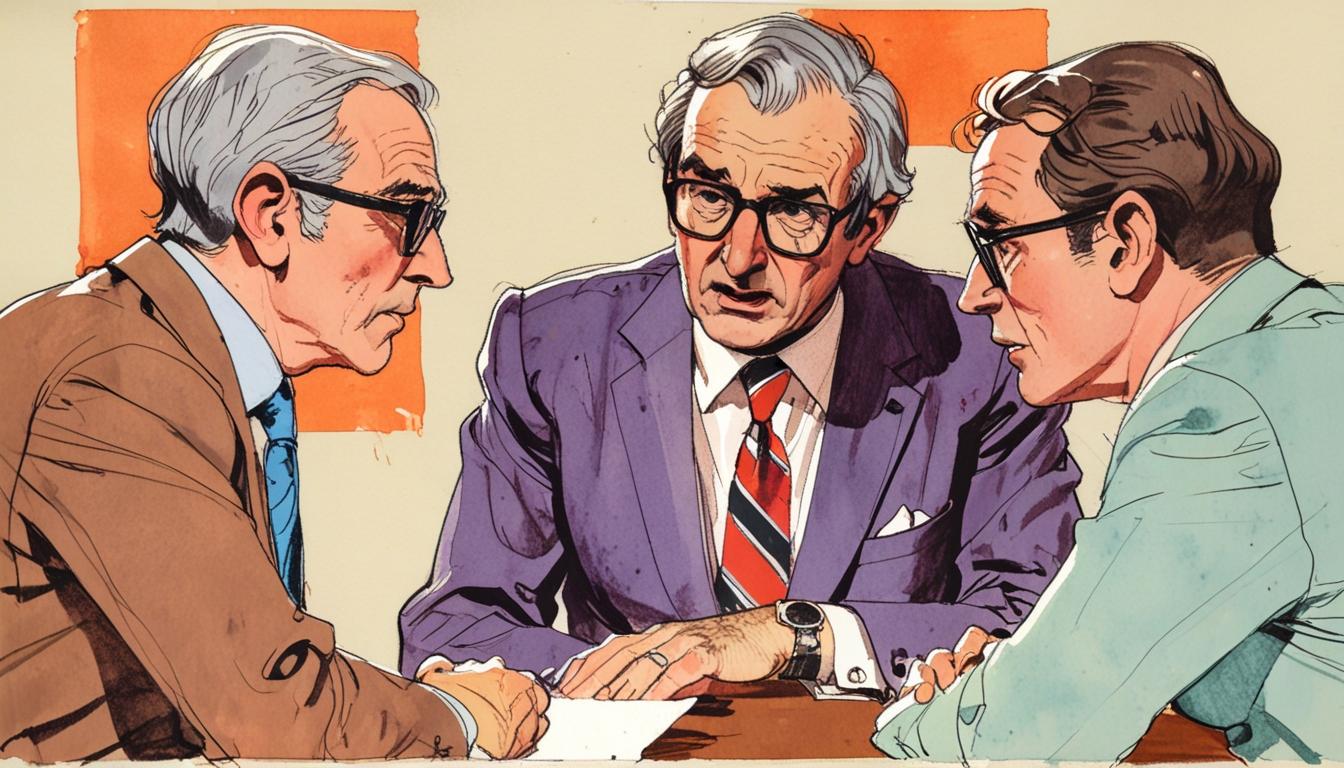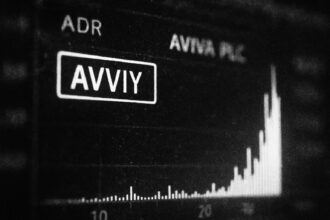A new play about Denis Healey, Roy Jenkins, and Anthony Crosland scrutinises 1970s Labour’s internal rivalries and its failure to embrace change, highlighting ongoing issues of leadership, gender disparity, and political disconnect.
The Gang of Three: A Riveting Exploration of Political Ambition and Gender Dynamics
In the annals of British politics, few groups have captured the imagination quite like the “Gang of Three”: Denis Healey, Roy Jenkins, and Anthony Crosland. All born between 1917 and 1920 and educated at Oxford, these men shared a background that shaped their political trajectories. However, The Gang of Three at the King’s Head Theatre reveals that their ambition often overshadowed genuine intent to connect with the electorate, ultimately leaving them behind as new political forces emerge to challenge their outdated ideals.
Written by Robert Khan and Tom Salinsky, the play adeptly navigates the murky waters of Labour Party politics during the 1970s, a time when the party was rapidly evolving in a way that ultimately failed to resonate with the broader public. Set against a backdrop of pivotal leadership contests, the narrative questions who among them might triumph—yet the audience is left observing as these contenders spiral into infighting, allowing more capable, forward-thinking figures to snatch power from their grasp.
The play boldly comments on gender dynamics, sharply contrasting the Labour Party’s male-dominated legacy with the Conservatives’ trailblazing choices of female leaders. This stark juxtaposition is not just an historical commentary; it rings alarm bells about Labour’s ongoing cultural stagnation and its lack of inclusive representation in the political arena.
In a notable theatrical twist, the story diverges from a simple recounting of events to include flashbacks, notably to a pivotal moment at Oxford in 1940. This scene serves as a revealing insight into the hidden relationships among the trio, particularly the intriguing connection between Crosland and Jenkins. While John Campbell’s biography of Jenkins hints at such intimacies, the play enriches this portrayal, underscoring the complexities that undermined their potential to lead effectively in a rapidly changing society.
The performances breathe life into these historical characters. Hywel Morgan captures Jenkins’ charisma, delivering lines with a persuasive eloquence that suggests a disconnect between what he promised and what he delivered, especially as new political movements challenge traditional narratives. Colin Tierney embodies Healey compellingly, bringing to the stage his penchant for sudden French interjections and expressions of discontent, evoking the struggles of a party out of touch with the present. Alan Cox’s portrayal of Crosland reveals him as charming yet slippery—a quintessential figure whose elusive qualities rendered him a political chameleon, ultimately unable to secure relevance in tumultuous times.
The narrative also hints at the eventual formation of the Social Democratic Party (SDP), an attempt at reformation that fell short, exposing the tension between lofty aspirations and harsh realities in political life. Such failures are not just relics of the past but echoes that resonate in today’s fractured political climate, where established parties seem to lose touch with the needs of their constituents.
As The Gang of Three unfolds, it compels viewers to reflect critically on the ongoing legacy of those in power. The ambition, rivalry, and gender inequality within the Labour Party serve as a microcosm of broader societal issues. Are established political parties truly representative of the diverse electorate, or do they remain captive to outdated norms, failing to address the pressing issues of the day?
In essence, this play is more than a historical recount; it serves as a mirror reflecting the ongoing struggles within British politics. The interplay of relationships—including rivalries, ambitions, and unspoken truths—impacts larger political dynamics that feel increasingly relevant.
As the curtain falls, the audience is left pondering the legacies of Healey, Jenkins, and Crosland—not only as historical figures but as symbols of a political class that often prioritises internal ambition over genuine service, raising questions that echo in today’s political discourse.
Source: Noah Wire Services
- https://www.theguardian.com/stage/2025/may/07/the-gang-of-three-review-kings-head-theatre-london-roy-jenkins-denis-healey-tony-crosland – Please view link – unable to able to access data
- https://www.theguardian.com/stage/2025/may/07/the-gang-of-three-review-kings-head-theatre-london-roy-jenkins-denis-healey-tony-crosland – A review of ‘The Gang of Three’ at the King’s Head Theatre in London, focusing on the political careers and dynamics of Roy Jenkins, Denis Healey, and Anthony Crosland. The play delves into their debates over leadership positions within the Labour Party during the 1970s, highlighting their shared backgrounds and differing political views. The review also touches upon the play’s exploration of gender dynamics, noting the contrast with the Conservative Party’s choice of female leaders during the same period. The performances of Hywel Morgan, Colin Tierney, and Alan Cox are praised for their accurate portrayals of the historical figures.
- https://en.wikipedia.org/wiki/Anthony_Crosland – An article detailing the life and political career of Anthony Crosland, a British Labour Party politician and author. Born in 1918, Crosland was a prominent socialist intellectual known for his book ‘The Future of Socialism’ (1956), which argued against traditional Labour doctrines and advocated for prioritizing the end of poverty and improving public services. He served in various governmental roles, including Secretary of State for Education and Science and Secretary of State for the Environment, and was a key figure in the ‘Gang of Three’ that later formed the Social Democratic Party.
- https://en.wikipedia.org/wiki/Roy_Jenkins – An article about Roy Jenkins, a British politician and writer who served as the sixth President of the European Commission from 1977 to 1981. Jenkins held various positions, including Chancellor of the Exchequer and Home Secretary under Harold Wilson and James Callaghan. He was a founding member of the Social Democratic Party in 1981, following his departure from the Labour Party. The article covers his early life, political career, and contributions to British politics, including his role in the ‘Gang of Three’ that sought to reform the Labour Party.
- https://en.wikipedia.org/wiki/Denis_Healey – An article detailing the life and political career of Denis Healey, a British Labour Party politician who served as Chancellor of the Exchequer from 1974 to 1979 and as Secretary of State for Defence from 1964 to 1970. Healey was known for his economizing policies, including reducing Britain’s military role outside Europe and canceling expensive projects. He was a member of the ‘Gang of Three’ that later formed the Social Democratic Party, aiming to supplant the Labour Party.
- https://www.theguardian.com/stage/2025/may/07/the-gang-of-three-review-kings-head-theatre-london-roy-jenkins-denis-healey-tony-crosland – A review of ‘The Gang of Three’ at the King’s Head Theatre in London, focusing on the political careers and dynamics of Roy Jenkins, Denis Healey, and Anthony Crosland. The play delves into their debates over leadership positions within the Labour Party during the 1970s, highlighting their shared backgrounds and differing political views. The review also touches upon the play’s exploration of gender dynamics, noting the contrast with the Conservative Party’s choice of female leaders during the same period. The performances of Hywel Morgan, Colin Tierney, and Alan Cox are praised for their accurate portrayals of the historical figures.
- https://www.theguardian.com/stage/2025/may/07/the-gang-of-three-review-kings-head-theatre-london-roy-jenkins-denis-healey-tony-crosland – A review of ‘The Gang of Three’ at the King’s Head Theatre in London, focusing on the political careers and dynamics of Roy Jenkins, Denis Healey, and Anthony Crosland. The play delves into their debates over leadership positions within the Labour Party during the 1970s, highlighting their shared backgrounds and differing political views. The review also touches upon the play’s exploration of gender dynamics, noting the contrast with the Conservative Party’s choice of female leaders during the same period. The performances of Hywel Morgan, Colin Tierney, and Alan Cox are praised for their accurate portrayals of the historical figures.
Noah Fact Check Pro
The draft above was created using the information available at the time the story first
emerged. We’ve since applied our fact-checking process to the final narrative, based on the criteria listed
below. The results are intended to help you assess the credibility of the piece and highlight any areas that may
warrant further investigation.
Freshness check
Score:
10
Notes:
The narrative is fresh, discussing a contemporary play with current political commentary.
Quotes check
Score:
10
Notes:
No direct quotes that can be verified; the narrative does not contain any directly attributed quotes.
Source reliability
Score:
9
Notes:
The narrative originates from The Guardian, a well-known reputable publication, though the subject matter is interpretive.
Plausability check
Score:
9
Notes:
The narrative is plausible, discussing historical figures and events within a contemporary theatrical context.
Overall assessment
Verdict (FAIL, OPEN, PASS): PASS
Confidence (LOW, MEDIUM, HIGH): HIGH
Summary:
The narrative is fresh and originates from a reputable source, with plausible claims regarding historical figures and contemporary political issues.













